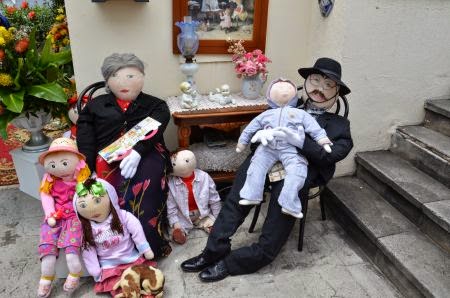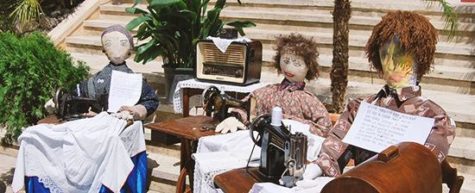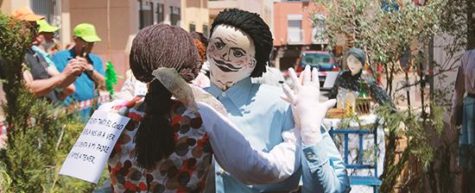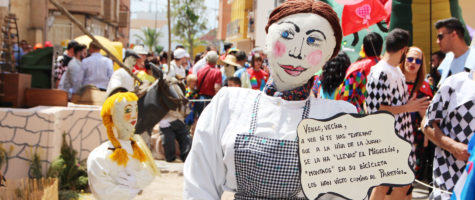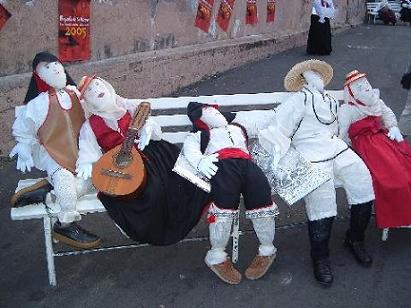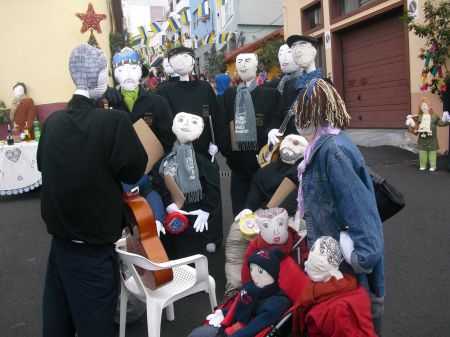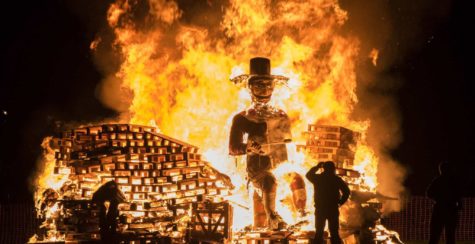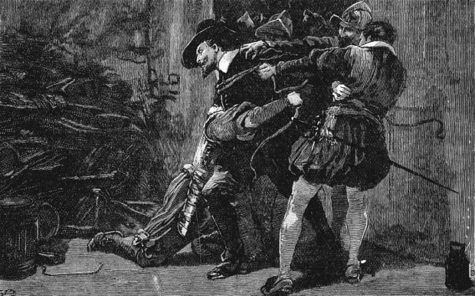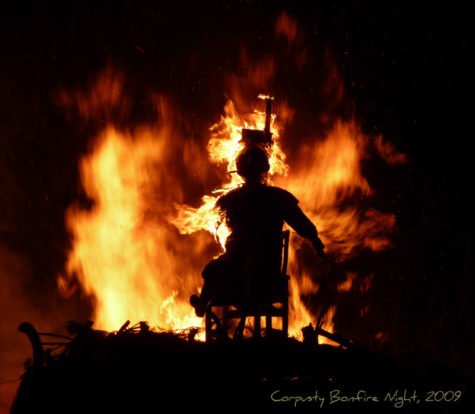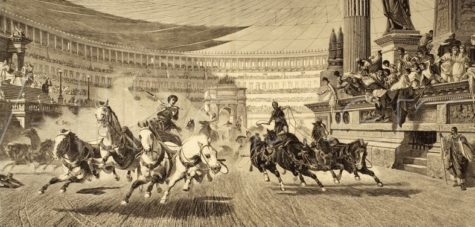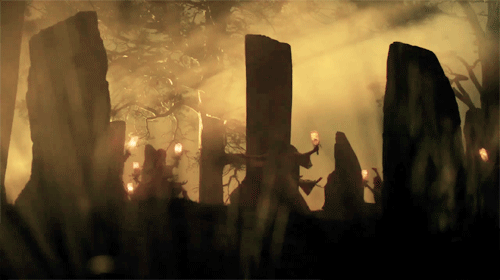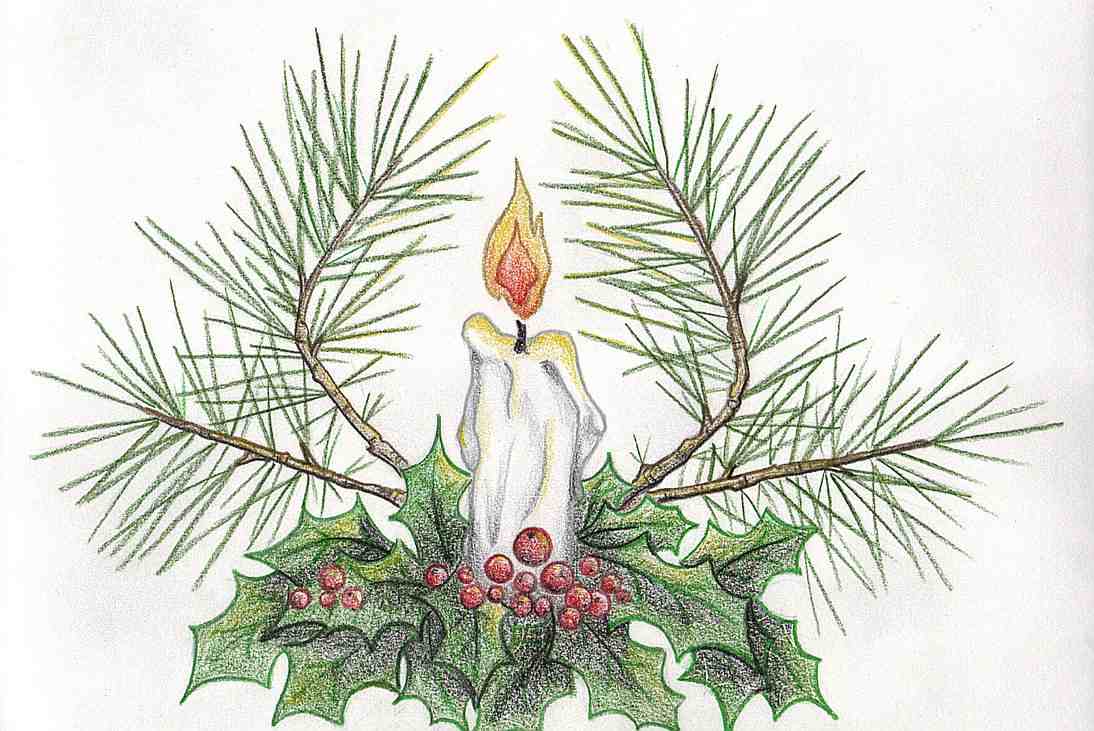Politics
Los Mayos is a festival that takes place on the first Sunday in May in Alhama de Murcia. Although its origin is unknown and much earlier on, the first written references to it date from the 1920s. The festival consists of placing life-sized dolls dressed in old clothes with human features painted on their faces on doorsteps of houses in order to create a scene. They are normally dressed in clothes from old professions, representing everyday situations, or satirising certain modern-day problems.
The big dolls are made from fabric, stuffed with straw and painted with individual faces. They represent real people and they carry messages written on pieces of paper they either hold in their hands or have pinned to their clothes. They are a sort of caricature.
These dolls are placed over night at houses and public places, so the population awakes to a whole new set of ‘people’. The messages are funny, or express a wish or ridicule a certain attitude or quirk of someone. The dolls remain in place all day, are removed at night and displayed again elsewhere the next day.
Later they enter into a competition. But that’s not all. They also have the corremayos, musicians dressed in harlequin costumes who roam the streets all day, singing and making music, entertaining people.
Source:
In Great Britain, Bonfire Night is associated with the tradition of celebrating the failure of Guy Fawkes’ actions on 5 November 1605. The British festival is, therefore, on 5 November, although some commercially driven events are held at a weekend near to the correct date, to maximize attendance.
Also known as:
- Bonfire Night
- Guy Fawkes Day
- Firework Night
Bonfire night’s sectarian significance has generally been lost: it is now usually just a night of revelry with a bonfire and fireworks, although an effigy of Guy Fawkes is burned on the fire. Celebrations are held throughout Great Britain; in some non-Catholic communities in Northern Ireland; and in some other parts of the Commonwealth. In the Canadian province of Newfoundland and Labrador, 5 November is commemorated with bonfires and firework displays, and it is officially celebrated in South Africa.
There are many food items that are associated with Bonfire Night. Toffee apples, treacle toffee, black peas and parkin, and even the jacket potato, are traditionally eaten around Bonfire Night in parts of England.
This Day in History
The history of this annual commemoration begins with the events of 5 November 1605, when Guy Fawkes, a member of the Gunpowder Plot, was arrested while guarding explosives the plotters had placed beneath the House of Lords. Celebrating the fact that King James I had survived the attempt on his life, people lit bonfires around London; and months later, the introduction of the Observance of 5th November Act enforced an annual public day of thanksgiving for the plot’s failure.
Within a few decades Gunpowder Treason Day, as it was known, became the predominant English state commemoration, but as it carried strong Protestant religious overtones it also became a focus for anti-Catholic sentiment. Puritans delivered sermons regarding the perceived dangers of popery, while during increasingly raucous celebrations common folk burnt effigies of popular hate-figures, such as the pope.
Towards the end of the 18th century reports appear of children begging for money with effigies of Guy Fawkes and 5 November gradually became known as Guy Fawkes Day. Towns such as Lewes and Guildford were in the 19th century scenes of increasingly violent class-based confrontations, fostering traditions those towns celebrate still, albeit peaceably.
In the 1850s changing attitudes resulted in the toning down of much of the day’s anti-Catholic rhetoric, and the Observance of 5th November Act was repealed in 1859. Eventually the violence was dealt with, and by the 20th century Guy Fawkes Day had become an enjoyable social commemoration, although lacking much of its original focus. The present-day Guy Fawkes Night is usually celebrated at large organised events, centered on a bonfire and extravagant firework displays.
Settlers exported Guy Fawkes Night to overseas colonies, including some in North America, where it was known as Pope Day. Those festivities died out with the onset of the American Revolution. Claims that Guy Fawkes Night was a Protestant replacement for older customs like Samhain are disputed, although another old celebration, Halloween, has lately increased in popularity, and according to some writers, may threaten the continued observance of 5 November.
One notable aspect of the Victorians’ commemoration of Guy Fawkes Night was its move away from the centers of communities, to their margins. Gathering wood for the bonfire increasingly became the province of working-class children, who solicited combustible materials, money, food and drink from wealthier neighbors, often with the aid of songs. Most opened with the familiar “Remember, remember, the fifth of November, Gunpowder Treason and Plot”.
The earliest recorded rhyme, from 1742, is reproduced below along with one bearing similarities to most Guy Fawkes Night ditties, recorded in 1903 at Charlton on Otmoor:
Don’t you Remember,
The Fifth of November,
‘Twas Gunpowder Treason Day,
I let off my gun,
And made’em all run.
And Stole all their Bonfire away.
~1742
The fifth of November, since I can remember,
Was Guy Faux, Poke him in the eye,
Shove him up the chimney-pot, and there let him die.
A stick and a stake, for King George’s sake,
If you don’t give me one, I’ll take two,
The better for me, and the worse for you,
Ricket-a-racket your hedges shall go.
~1903
Sources:
The Plebeian Games were an ancient Roman religious festival held November 4–17. The games included both theatrical performances and athletic competitions for the purpose of entertaining the common people of Rome.
The Ludi Plebeii comes from the two words ludi (meaning play, games, etc.) and plebeii (meaning a “pleb” or plebian: a commoner person as in comparison ta member of the royal or upper class). The Ludi Plebeii or Plebeian Games were an ancient Roman festival held from November (which is derived from novem or 9, because it was originally the ninth month of the year) 4th to the 17th.
The ludi or game factor of the festival was because this celebration had both theatrical performances( such as comedy, satire, tragedy plays) and athletic competitions (running, chariot racing,etc).
The importance of the Ludi Plebeii is because it represents one of the earliest national holidays of liberation. Similar to the United State’s Fourth of July or the French holiday Bastille Day, the Ludi Plebeii celebrated the plebeian’s political liberty. The Ludi Plebeii are thought to be the oldest public festival having been established roughly in 220 BCE. The great orator Cicero considered them Rome’s oldest Ludi.
The liberation that is being celebrated often varies from the tyranny of the Tarquins (an Etruscan Roman family whose history can be read on here ) or the suppression and dominance of the patricians (who were the ruling class of Rome in the struggle known as the Conflict of the Orders). Some historians even conjecture that the festival was celebrated before 220 BCE, but due to the lack of a religious calendar it was not recorded.
The dates vary for the happenings of the festival; however, they seem to follow a certain pattern:
During the Ludi Plebeii, the first ceremonial rite was a feast to Jupiter (Zeus) known as Epulum Iovis was held on November 13th (some sources say the Ides of November which is the 15th). This feast entitled the Senator to eat on the Capitoline as the public’s expense while the Roman plebeians or commoners dined in the Forum. Following the feast were several days of performance and games ( theses days vary from 9 of performance and 4 of games to smaller denominations). On the day of the Games, a great Pompa, or procession, led by statues of the Capitoline Triad, would proceed to the Circus, where Gods and men joined to watch the races. The games usually ended on the 17th of November.
A more scholarly description is as follows:
The Ludi Plebeii were, according to Pseudo-Asconius, founded to commemorate the freedom of the plebeian order after the banishment of the kings, or after the secession of the plebs to the Aventine. However, historic evidence does not support the first theory and it is likely that these games were instituted in commemoration of the reconciliation between the patricians and plebeians after the plebeians removed to either the mons sacer or, according to others, the Aventine.
The Ludi were initially conducted from November 16-18, overseen by the aediles plebis. The aediles were garbed in the robes of a triumphator, hinting at a link between the games and the ancient triumphal rites. They are almost certainly the oldest games extant, second only to the Ludi Romani held in September. Legend places the Ludi in the early history of Rome, however, the earliest mention by Livy sets the games in 216 BCE in the Circus Flaminius, built around 220 BCE and the latest record of the games can be found on the Calendar of Philocalus.
By 207 BCE the Ludi were celebrated over several days, and the Fasti Maffeiani, one of the most important surviving contemporary calendars from the Augustan era, sets the Ludi from 4-17 November.
The central focus of the Ludi was the Epulum Iovis, or feast of Iuppiter, on the Ides of November, this date being sacred to Him. The Senators ate at public expense on the Capitoline, while the Roman public dined in the Forum. The Epulum Iovis were preceded by nine days of theatrical performances and four days of racing in the Circus. On the day of the Games, a great Pompa, or procession, led by statues of the Capitoline Triad, would proceed to the Circus, where Gods and men joined to watch the races.
Titus Maccius Plautus (254-184 BCE) probably sold his first plays at the Ludi, and his play Stichus was first performed at the Ludi Plebeii. Plautus’ puns and slapstick humour were greatly valued by the Romans themselves (if not by the likes of Horace and Augustus) and influenced a much later playwright from the 16th Century: William Shakespeare.
The modern and beloved musical, A Funny Thing Happened on the Way to the Forum is inspired by Plautus and contains many of his characters, including Miles Gloriosus, the braggart soldier, Pseudolus, the wily slave, and Senex, the doddering oldster.
Sources:
